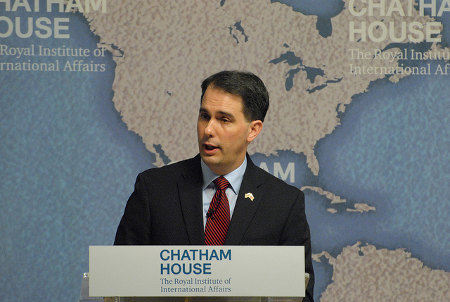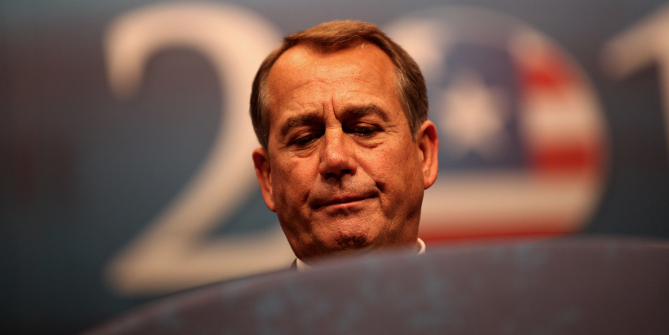USApp Managing Editor, Chris Gilson looks at the best in political blogging from around the Beltway. Our round-up of state blogs will follow on Saturday afternoon.
President Obama, the Democratic Party, and the GOP
On Monday, The Atlantic previews an upcoming vote in the House of Representatives that they say will be one of the biggest of President Obama’s final two years in office – a vote on whether to give the President the authority to negotiate trade deals which Congress will not be able to amend. They say that the Obama will only need the support of 20 – 25 Democrats, which in theory should not be hard, save for the fact that most of those in the party are opposed to the bill.
On Wednesday, White House Dossier comments that the White House is trying to bully the Supreme Court, after Press Secretary Josh Earnest suggested that the Court would be responsible for wrecking health care in the U.S. if it decides to invalidate the tax credits for Obamacare’s federal exchanges. Meanwhile, Red State reports that a new poll has revealed that Americans now have a more favorable view of former President George W. Bush than President Obama, with 52 percent viewing Bush favorable compared to only 49 percent for the current President.

Moving on to the Republican Party, Political Animal writes this week that the relative success of Wisconsin Governor, Scott Walker, in the GOP’s presidential primary shows that the party’s base has learned some lessons given that he is devoid of what they say is the ‘raw charisma’ that presidential ambitions usually require. Many feel that Walker is something of a conservative ideologue – this fits with Wonkblog’s story that moderate Republicans have become an endangered species. Using an effective chart, they show that Republicans in the House and Senate have drifted away from the center far more rapidly than Democrats have. Daily Kos also looks at Republicans, reporting that a new poll has shown that most in the GOP reject the idea that the federal government should try to reduce the gap between the wealthy and the less well-off.
Elections and the road to 2016
On Thursday, Sabato’s Crystal Ball has a very interesting piece on how negative partisanship is shaping the outlook for the 2016 election. They argue that a growing number of Americans are voting against the opposing party, rather than for their own.
An early highlight of the presidential cycle is the Iowa Straw Poll among state Republicans. Outside the Beltway examines what they say is the slow death of the Straw Poll, in light of the fact that a number of presidential candidates such as Florida Senator Marco Rubio and former Arkansas Governor, Mike Huckabee. They argue that if the Iowa straw poll is dying off, then this can only be a good thing as it is ‘completely useless’ in actually measuring a candidate’s support in the state.
Moving on to the Democratic side of the 2016 presidential race:
- Former Maryland Governor Martin O’Malley launched a ‘quixotic’ run for the White House (Outside the Beltway)…
- …while PoliticusUSA argues that O’Malley needs a ‘reboot’ before he ruins the Democratic primary with ‘cheap shots’ against Hillary Clinton.
- Vermont Senator Bernie Sanders is gaining momentum in Iowa (Crooks & Liars), and is being taken seriously elsewhere too (Americablog).
- Moving on to the Democrats’ front-runner, American Thinker says that former Secretary of State, Hillary Clinton, is a ‘pathetic nobody’ with little in the way of accomplishments or talent.
- Monkey Cage says that Clinton’s poll numbers are falling – but only among Democrats…
- …while Americablog reports that Clinton has ‘come out swinging’ on voting rights with a call this week for universal voter registration and at least 20 days of early voting nationwide.
- Could former Rhode Island Governor Lincoln Chaffee be Clinton’s biggest problem? (The Atlantic)
- At least Clinton no longer has to worry about Elizabeth Warren (Political Animal)

Turning to the GOP side of the 2016 race:
- South Carolina Senator Lindsey Graham announced that he is running for president this week – but does his focus on national security policies make him the winner already? (FiveThirtyEight).
- Graham is also the bluntest candidate for president (Wonkblog).
- Kentucky Senator Rand Paul’s campaign is struggling (The Atlantic)
- The former Governor of Texas, Rick Perry, also announced his candidacy this week. Smart Politics says that he has the most gubernatorial experience of any candidate in history.
Government, the Beltway and Congress’ agenda
On Tuesday, The Daily Signal argues that Transportation Security Administration (TSA) should be privatized after undercover agents were able to carry fake weapons through checkpoints in 67 out of 70 attempts at major airports.
On Sunday, Outside the Beltway previews what they say will be a busy June for the Supreme Court. The Court is due to hand down decisions on same-sex marriage, redistricting, and methods used for lethal injections, amongst others.
The Volokh Conspiracy this week looks at how much Congress has changed on surveillance in light of the wrangling in the Senate over the reauthorization of Section 215 of the US Patriot Act, which covers the collection of meta-data by the National Security Agency (NSA). They say while many claim there has been a real shift in the debate over surveillance, in its original form, the Patriot Act did not actually cover the bulk collection of data.
Moving on to the Senate itself, The Daily Signal reports on Monday that there was no deal to be struck on the Patriot Act, meaning that the NSA’s data collection program expired at midnight on the 1st. They say that the legislation was primarily blocked by Senator Rand Paul (R-KY) who opposes the government’s collection of telephone records. By Tuesday, though, according to Crooks & Liars the Senate was able to pass the House’s USA Freedom Act, which places restrictions on the NSA’s collection of data, much to the chagrin of the Senate Majority Leader, Mitch McConnell who had been pushing for a full reauthorization. Monkey Cage, meanwhile, cautions us that the Senate did not really do a great deal to curb the government’s metadata collection, arguing that the new bill will expand the government’s ability to analyze the data it does collect.
Foreign policy, defense and trade

Picking up on the role of the Patriot Act in the fight against terrorism, Informed Comment argues this week that it was actually more about spying on people and violating their civil liberties than keeping them safe.
Why has the U.S. stopped winning wars? The Atlantic looks at this question, writing that its losses are not for lack of power, but more because conflicts have moved from being between countries to within them.
This week, The American Interest wonders if China takes the U.S. seriously, after the recent war of words over China’s increased presence in the South China Sea. They say that the dangerous situation in that region is the result of years of broken promises and idle threats from the U.S., and that it must ensure that its words and guarantees are credible.
On Tuesday, White House Dossier argues that Secretary of State, John Kerry should be removed from the current negotiations in Iran after he broke his leg whilst cycling in the French Alps. Still on Iran, Informed Comment says that those in the U.S. who want to bomb the country, such as hard-line Senator Tim Cotton (R-AR) are gearing up to influence the 2016 election and to as well as the current negotiations.
Obamacare and health policy
In a few weeks’ time, the Supreme Court will rule on the King v. Burwell case which covers the tax credits provided by the Affordable Care Act to those who get health insurance on Obamacare’s federal exchanges. Monkey Cage argues that if the GOP wins the case – and the tax credits are thrown out – then they will be the losers, as 9 million people will lose their tax credits in states controlled by Republicans. If they are successful in their Supreme Court challenge, the GOP will have to propose some kind of amendment or alternative to Obamacare. The Hill’s Congress blog says that many Congressional Republicans who oppose Obamacare have a conflict of interest in that they (and their staff) enjoy similarly contested Obamacare subsidies.
When Obamacare launched towards the end of 2013, many commentators predicted a ‘death spiral’ whereby young and healthy individuals would not sign up, driving up costs for those who needed health insurance the most. The Federalist argues this week that this death spiral may still be on the cards as many insurers are due to raise their premiums in 2016 to make up for profit shortfalls. The American Interest says that many are chafing under the cost of Obamacare already – according to a California study, 44 percent of policyholders are having difficulty affording their premiums.
A key part of the Affordable Care Act is the expansion of Medicaid; with those states that do so being given match funding by the federal government until the end of 2016. At this point, 21 states have not expanded Medicaid – National Journal says that if these states want to benefit from this funding they need to act fast, as after 2016 the match funding rate begins to decline.
The economy and society
This week, The Daily Signal gives 7 ways to roll back the welfare state, which they say are needed because of its massive costs and the fact that it encourages dependency. Their suggestions include repealing Obamacare, introducing means-testing for social security, and increasing federalism.

On Monday Wonkblog says that new data shows that 1 in 13 gun killings are committed by police – with 385 such killings already this year. The Atlantic meanwhile looks at why it is so difficult to track police killings, writing that few local police departments have such statistics that could be put together at the state level.
On Thursday, The Daily Signal says that only 33 cities in the U.S. have recovered from the recession so far, despite unemployment falling to its lowest level since 2008.
Americans are getting more and more pro-choice on abortion, with more than half identifying that way according to a new poll writes Hit & Run.
And finally…
FreakOutNation says that GOP House Representative Lynn Jenkins (R-KS) has said that her intern who was recently arrested for bringing gun into the U.S. Capitol showed ‘poor judgement’.
Wonkblog has a nifty map of what every state would be if it were a country, based on the size of its economy.
Featured image credit: Gage Skidmore (Flickr, CC-BY-SA-2.0)
Please read our comments policy before commenting.
Note: This article gives the views of the author, and not the position of USApp– American Politics and Policy, nor of the London School of Economics.
Shortened URL for this post: http://bit.ly/1JwQknJ






